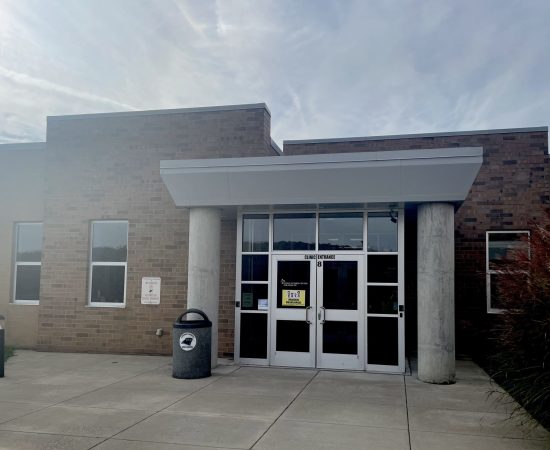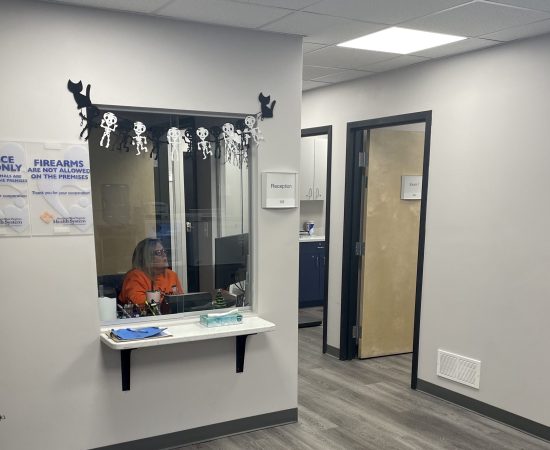by Amelia Ferrell Knisely
School-based health clinics, which serve kids impacted by West Virginia’s poverty and drug epidemic, are infusing kids’ mental health services into rural areas.
The Southern West Virginia Health System, which serves seven counties, now operates 12 school-based clinics in Boone, Lincoln and Logan counties.
“It’s hard for adults to understand what’s going on with their family members, and it’s even harder for children to go through that,” said Courtney Reynolds, chief operating officer for SWVHS. “Our providers become part of the school. Our students get used to seeing them, so there’s a comfort level in going to see them.”
SWVHS health professionals respond to childhood medical needs, including some dental issues, along with the need for other sports, like food assistance and behavioral health support.
West Virginia has a mental health care provider shortage. In response to an acute need, SWVHS leaders added the program’s first psychiatric nurse practitioner who works throughout its school-based health systems.
“She will help with any of the behavioral mental health needs the students may have,” said Reynolds. “It is important for an area that has been hit by the opioid crisis.”
The health system serves many of the state’s counties that have been hit hardest by the state’s drug epidemic, which has acutely impacted children in the historically impoverished state. As the state prepares for an influx of $1 billion in opioid settlement funds, SWVHS health professionals every day see the health and service gaps that impact kids in West Virginia.
“A lot of families suffer in silence,” said Karyn O’Dell, communication and leadership development strategist for SWVHS.
“We find that in the southern part of the state, we have a lot of pride in taking care of our own and not burdening [others]. In some areas, some needs are going unmet because they don’t want to tell you what their situation is.”
Meeting kids where they are
SWVHS, which opened in 1975, is a Federally Qualified Health Center, meaning it receives grant funding to provide affordable primary health care services in underserved areas. The health system focuses its care on uninsured or underinsured adults and children.
Alongside its school-based health clinics, grant-funded SWVHS operates clinics for adults and has added large, multi-service facilities in Hamlin, Man, and South Charleston. SWVHS merged with Hygeia Facilities Foundation, Inc. earlier this year, adding additional school-based clinics.


“One of our goals is to help keep kids in school,” said Reynolds, who has been with SWVHS for more than 16 years.
In schools, the clinics are focused on filling a gap in health care. Nationally, the majority of rural areas are what’s known as “doctor deserts” – meaning they don’t have enough or any medical providers – and it regularly leads to poor health outcomes for those who live there.
As O’Dell traveled for her job around the southern part of the state, she noticed the lack of medical care in many small, isolated communities. Some families don’t have cars to access care. Without school-based medical services, she said, kids in those communities could wait for care.
“If you’re already not feeling well and your parents are working two jobs to keep the family economics going, that could mean it could be a couple of days before you could be seen [by a doctor],” she said.
O’Dell added that school consolidations have forced some students to spend more time on school buses – decreasing the time that they can see a doctor outside of school hours.
“If you have the services available and the consent already signed, that makes a world of difference in helping that child receive timely and effective care,” she said.
The school-based clinics also expose children to preventative care, O’Dell noted. Research showed that people living in rural areas, including those enrolled in public health insurance programs, often seek preventive care less than people in urban areas. Children in rural areas routinely face barriers to medical care.
“It helps to improve the way they see receiving health care into adulthood,” she said.
She continued, “I have been just overwhelmed and impressed with what our organization has been able to do in terms of keeping rural healthcare access points available to rural communities.”

Investing in mental health services and substance abuse prevention
As the state prepares for an influx of $1 billion in opioid litigation settlement funds, service providers have spoken out about the importance of those funds going directly to help families impacted by the pharmaceutical companies’ role in the drug epidemic.
Part of the work at SWVHS includes helping kids and parents access other needed resources, like food and mental health care providers.
But, the state faces a shortage of fresh food grocers and pediatric mental health services, making it sometimes difficult for SWVHS employees to help families in need.
Reynolds explained that part of the school-based clinics’ work includes trying to address the state’s childhood obesity problem and educating families about healthy food choices. Historically, families in the area have struggled to access and pay for fresh food, she said, and now it’s more difficult due to soaring food prices.
Research suggests a strong correlation between food insecurity and substance abuse.
“There is a desire but sometimes there’s not the opportunity,” Reynolds said. “We still struggle with availability.”
O’Dell added, “When you lose a family grocer or you’ve lost Kroger – and there are areas of the state that don’t even have an entire grocery store – your choices become different. Your economics drives your ability to make choices for yourself.”
“The challenge of access points is real, and it can be devastating to see,” she added.
There is also the need for more mental health care for kids, she said, and SWVHS regularly see children experiencing trauma associated with the state’s drug epidemic.
Some of the kids are being raised by their grandparents. Healthy Grandfamilies, a nonprofit organization in West Virginia, estimated that nearly half of grandparents in most counties are raising their grandchildren – largely due to the drug epidemic.
There are few guardrails on how the opioid litigation settlement money can be spent, and the bulk of the funds will be overseen by a foundation that includes members hand-picked by the governor. Local governments will split about 25% of the funds.
Reynolds said she’d like to see settlement funds invested in an infrastructure that supports families, including more health care access points and programs that support the state’s overburdened foster care system. “Drill it down to have more positions to take care of the needs,” she said.
Several West Virginia nonprofits, including SWVHS and Healthy Grandfamilies, stressed the need for behavioral health services for children.
“It affects their learning because of stress, anxiety and changes in their lives,” Reynolds said.
“In southern West Virginia, there has been a stigma for mental health services and receiving those services for a very long time,” she continued. “If a child grows up in a school [with] a therapist that’s there and available that’s normal for them. As they grow older, it’s normal. Breaking that stigma and making it common is so very important.”
She added that placing counselors in schools may help prevent future substance abuse issues.
“If [children] know how to treat their anxiety and how to reach out when they’re in pain … you can prevent some of these situations where people fall into drug abuse.”

Amelia Ferrell Knisely is an award-winning journalist with West Virginia Watch, a nonprofit newsroom. Originally from Rand, West Virginia, she has previously written for Mountain State Spotlight and the Charleston Gazette-Mail about child welfare, hunger and poverty. Ferrell Knisely also previously worked for The Tennessean in Nashville. Follow her on Twitter.



0 Comments